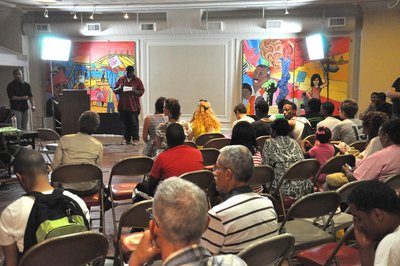How can LGBTQ youth and youth allies be more visible in their schools and communities, so they can support each other and create safer and more inclusive environments?
This is the question that 31 youth spent time answering this summer in a service-learning project at The Attic Youth Center.
The initiative, first held last summer and funded by the Philadelphia Youth Network WorkReady Program, allowed youth age 14-18 to work for 20 hours a week at The Attic on two of six possible projects — video production, memoir writing, public speaking and performance, research, mural painting and T-shirt designing.
The finished products, which all sought to answer the overarching question of youth visibility and empowerment, were unveiled in a public reception that drew about 100 guests Aug. 11.
“I really can’t believe what an amazing job these young people did in addressing these issues,” said Carrie Jacobs, executive director of The Attic.
The teens’ creations were the result of six weeks of hard work, Jacobs said.
For instance, the mural group members decided to create a piece that depicted a series of LGBT icons and spent time interviewing Attic youth on the figures they’d like to see before they got to work on the painting, which will now be hung in The Attic.
The participants in the video-production group interviewed people from around the city on their experiences with bullying, and the research team reached out to representatives of such agencies as the Department of Human Services and City Council to collect their insight on the state of youth bullying in Philadelphia.
Jacobs noted that one organization, the School District of Philadelphia, did not respond to the research group’s requests, which was a tough lesson for those members.
“They pointed out in their presentation that that was very sad because that’s where kids receive the most amount of bullying and it speaks very poorly about the school district,” she said. “From the youth’s experience, they’re not implementing [antibullying policies] much and there are few consequences [for bullies] from their point of view, so it would have been really important for the district to have participated in this.”
Conversely, the group was impressed by the participation of City Councilman Jim Kenney, who came out to The Attic to speak with the youth about bullying.
“Councilman Kenney was really great,” said D’Angelo Cameron, 18, a research group member. “He really made the point that while it’s important to be talking about bullying and these issues, people need to be working on things that can actually be done to stop bullying. Especially with the budget cuts and all of the other issues the city’s facing, they need people to be working together on real solutions to this problem.”
While the tangible products the youth produced were remarkable, Jacobs said, the real-life skills they’ll walk away with — decision-making, analysis, research and interviewing — are even more valuable.
One of the most important lessons the youth grappled with was conflict resolution, she noted, as the diverse group of teens came together to work as teams.
“We had a number of straight kids working on the projects and just right there they all had to deal with their differences. They met for an hour before their work groups each day to address diversity issues, and the gay/straight issue came up because for a lot of these non-gay kids, it was the first time they were in an environment where they were in the minority,” Jacobs said. “So there were some struggles, but they came out on the other side and at the event really showed that they all worked together as a group.”
Cameron agreed that the program helped him learn to work effectively with people of all walks of life, a beneficial lesson as he prepares to head to La Salle University later this month.
“I was really impressed by how well everyone came together throughout the summer,” he said. “It taught me how to work alongside other people to accomplish your goals. I’m going to be around people of different backgrounds, different cultures, from all places, and I’m going to need to know how to work well with all of these people, and this program showed me how to do that.”
Jen Colletta can be reached at [email protected].
